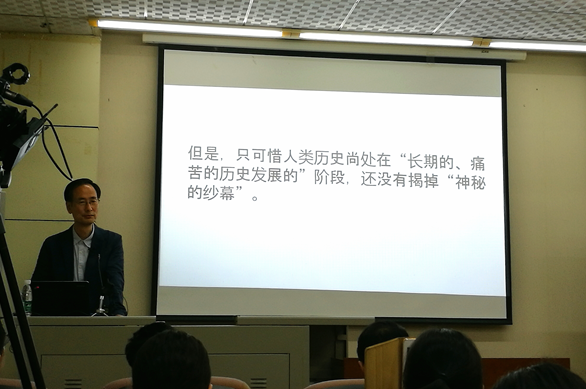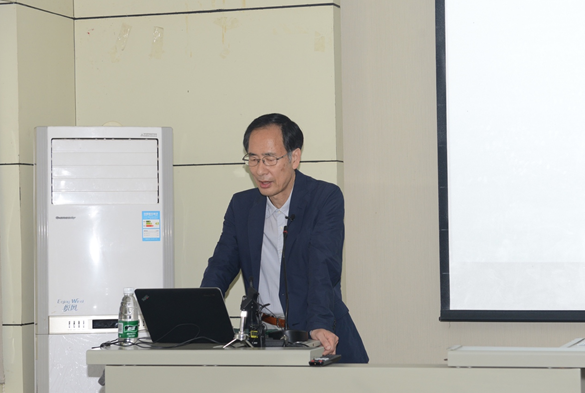Watanabe Masao, Doctor of Sociology from Hitotsubashi University, Japan, held a series of lectures in WHU in late April. The subject of the lectures mainly concerned Karl Marx’s classic masterpiece Das Kapital, cultural studies and neoliberalism. Four lectures were held: The Domain of Alienation Theory in Das Kapital, The Stoff and Kraft in Das Kapital, Spirited Away and Das Kapital, Dreams and Reality in Capitalist Countries after the World War II.
The first lecture was The Domain of Alienation Theory in Das Kapital which centers on the problem domain of the alienation theory in Das Kapital. Influenced by the German philosopher George Wilhelm Friedrich Hegel (1770-1831), Karl Marx reconstructed the theory of alienation into one of his most fundamental theories, which formed the foundation of Marxism theory in social class and history. Karl Marx's theory of alienation describes the estrangement of people from aspects of their "species-essence" as a consequence of living in a society of stratified social classes. The alienation from the self is a consequence of being a “mechanistic” part of a social class, the condition of which estranges a person from their humanity.
Some scholars believe that the alienation theory was not consistent and consecutive, and there was a “breakage” or “fault” in 1845 when the 1844 Manuscript on Economics and Philosophy was published, and that marked the turning of Marxism from alienation theory to historical materialism. While professor Watanabe argued that the alienation theory had never been abandoned, instead, this theory was inherited, deepened, and developed by Karl Marx in his later works.

Prof. Watanabe thought that human history remains in the undiscovered period, with curtains waiting to be uncovered
The second lecture discussed two important German etymons: Stoff (material) and Kraft (power, labor and force). Prof. Watanabe said that the concept of material exchange or metabolism falls into the natural science category, while the duality of Stoff (material) in usage, production, exchange, etc. brings this concept in line with the social science category. Subsequently Prof. Watanabe argued that the Kraft, which combines natural and human forces, produces human labor, and capitalists later buy the production of labor, which leads to other problems such as disproportionate salary, exploitation, social classes, etc.
This lecture demanded the audience's solid theoretical foundation in Marxism, furthermore the discussion on two not so well-known concepts added another layer of complexity for the audience, however still some students were quite interested in this issue and exchanged their opinions with Prof. Watanabe.

Prof. Watanabe at the lecture
The third lecture seemed to be more colorful and less theoretical, during which Prof. Watanabe compared characters in the film Spirited Away with the social classes mentioned by Karl Marx in Das Kapital. Spirited Away is a 2001 Japanese animated fantasy film telling the story of a ten-year-old girl who, while moving to a new neighborhood, enters the spirit world. After her parents were transformed into pigs by the witch, the little girl takes a job in the witch’s bathhouse in order to find a way to free herself and her parents and return to the human world.

A Spirited Away movie poster
Prof. Watanabe analyzed the characteristics of different figures in this film from the perspective of Marxism, and he argued that these figures resemble different social classes which were mentioned in Das Kapital: the witch represents the industrial capitalists; the witch’s twin sister is the financial capitalists because she loans money to the witch; the mysterious ghost—“No-Face”—is the personification of globalization, and the girl’s parents are the embodiment of the working class since they are changed into pigs. Prof. Watanabe’s novel interpretation caught the audience’s attention.
The last chapter of Prof. Watanabe’s lecture series was titled Dreams and Reality in Capitalist Countries after World War II. Prof. Watanabe said that after WWII, welfare capitalism—capitalism that includes social welfare policies—portrayed a “classless society” illusion to working classes all over the world, and scholars like Francis Fukuyama put forward that it was “the end of history” because capitalism would be better than socialism. While the fast development of capitalism at that time was based on the suppression over labor movements, the reality turned out to be that working classes missed the opportunities to expand themselves, and the promise of a welfare state became only a dream in the end.
Photo by: Sheng Fugang/ Li Yunzhen/ congtruongit.com; edited by Liu Li, Edmund Wai Man Lai & Hu Sijia